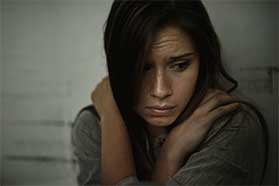Schizophrenia Treatment in Woodstock, GA

Schizophrenia is a pervasive, life-altering mental disorder that presents with hallucinations, paranoia, delusions, cognitive disorders and movement issues. Those with schizophrenia can be mentally consumed by the illness. Although it is one of the most severe mental illnesses, schizophrenia is controllable.
What is Schizophrenia?
The hallmark of schizophrenia is that a person’s perception of reality is altered. They can no longer tell the difference between figments of their mind and the actual world, this leads to drastic behavior changes and a profound impact on day-to-day life. This occurrence of indistinguishable reality is called, “psychosis.”
A defining feature of schizophrenia is the presence of psychotic episodes. These episodes occur when symptoms of psychosis rear their head. In a psychotic episode, accurate perception of reality is replaced by hallucinations, delusions, and in some cases, paranoia.
Symptoms of Schizophrenia
To understand the wide variety of symptoms schizophrenia sufferers may experience, a new organizational system was devised. Symptoms are now organized into three categories, “positive symptoms,” “negative symptoms” and “cognitive symptoms.”
The first category is positive symptoms (psychotic symptoms). Think of these as symptoms added to an otherwise normal person:
- Hallucinations: Hallucinations are the perception of sounds, sensations or sights that do not exist. Auditory hallucinations are the most common form associated with schizophrenia in which sufferers hear sounds like people threatening or telling them to do things. Olfactory (smell), tactile (sensation on skin), gustatory (taste), and somatic (seriously bodily injury like severed limbs or animals eating their way into their body) are exhibited as well.
- Delusions: When someone has an unwavering belief despite all evidence to the contrary, this is a delusion. Those with schizophrenia may have delusions of grandeur in which they genuinely believe themselves to be kings, queens, presidents, even God.
- Catatonia: A state in which someone freezes in a position. Think of those human statues in the park, it’s very similar. They remain expressionless (flat affect), regardless of external stimuli.
-
Disorganized symptoms: Disorganized symptoms are a category under positive symptoms that contain key characteristics of schizophrenia. This includes symptoms like:
- Nonsensical speech. Thoughts/speech that move from one topic to another with loose association. Or “word salad” a term for a jumble of words that do not make sense.
- Indecisiveness
- Memory issues
- Slow body movements
- Inability to interpret everyday sensory inputs
Cognitive symptoms of schizophrenia involve higher reasoning skills and cognitive function.
- Reduced executive functioning: Executive functioning is the ability to comprehend and use information (problem solving).
- Attention problems: Many experience trouble paying attention and maintaining focus.
- Memory issues: Issues with working memory are common among those with schizophrenia. Working memory is a system responsible for holding, storing, comprehending and using new information.
Negative symptoms are the last category, think of these symptoms as things missing from an otherwise healthy person:
- Lack of emotions: A reduced range of emotions is common in those with schizophrenia.
- Withdrawal: Withdrawal from friends, family, and society.
- Speech issues: Apart from the incoherent nature of work salad and loose association, selective mutism may be a feature of schizophrenia.
- Loss of motivation and interest in life: A lot like depression , schizophrenia may cause a loss of interest in things you once liked.
- Poor personal hygiene: Poor hygiene is a common characteristic of those who suffer from schizophrenia.
- Lack of energy: A lethargic state may also be a symptom of those who are schizophrenic, especially after a psychotic episode.
Causes of Schizophrenia
Once thought to be a product of poor parenting, schizophrenia is actually a result of several issues including brain chemistry, brain structure, genetics and environmental factors. With a typical onset in early adulthood, schizophrenia can span the majority of someone’s lifetime.
A family history of schizophrenia puts you at greater risk of developing the condition, as there is evidence to support the fact that schizophrenia is hereditary in nature. A disruption in the way your brain manages and manufactures specific neurotransmitters (brain chemicals) is also a leading hypothesis for the cause of schizophrenia. Many believe that dopamine receptors and glia cells (neuron supporting cells) are at the root of the cause. Viral infections, toxins, drug use, bodily changes (puberty, hormone changes) can also incite the first occurrence of schizophrenia and psychosis.
Treatment of Schizophrenia
Unfortunately, there is no known cure for schizophrenia, although there are a myriad of treatment options available to help control the many symptoms of this debilitating condition.
There are several medications that have been used to treat the psychosis associated with schizophrenia; these are a category of drugs called antipsychotics (loxapine, haloperidol, thiothixene, and several others). Medication is not the only answer. However, therapy is often used in addition to pharmacological help.
Cognitive behavioral therapy, psychosocial therapy and group therapy have proven effective in teaching coping strategies to both those with schizophrenia and their families. In therapy, occupational, special and relationship difficulties are troubleshot. Contingency plans are also made in the event of a relapse of symptoms and psychosis.
More often than not, if there is a severe relapse, hospitalization may be required. There are specific clinics that offer care for schizophrenics on an outpatient basis, but for those who are a risk to themselves and others, those too old or too compromised to function independently, hospitalization may be necessary.
With the hospital comes images of electroconvulsive therapy (ECT). Often used in films and television shows, ECT is indeed real. A specific amount of current is administered through the brain via electrodes attached to the head. When current is passed between the electrodes, they pass through the brain “jumpstarting” the circuit that is our brain. This produces a controlled seizure. ECT is mainly used for severe cases that are resistant to other treatment options.
Schizophrenia is a debilitating mental condition, but with the correct treatment, there is hope. If you—or a loved one—have schizophrenia seek help today.
Request more information about schizophrenia today. Call (770) 674-6311 or contact Natural Medical Solutions Wellness Center online.
Natural Medical Solutions Wellness Center
Address
1130 Upper Hembree Rd.Roswell, GA 30076
(770) 674-6311
www.natmedsol.com
Hours
Mon:
9:00 am - 4:00 pm
Tue:
9:00 am - 4:00 pm
Wed:
9:00 am - 4:00 pm
Thu:
10:00 am - 6:00 pm
Fri:
9:00 am - 2:00 pm
Sat:
9:00 am - 2:00 pm

